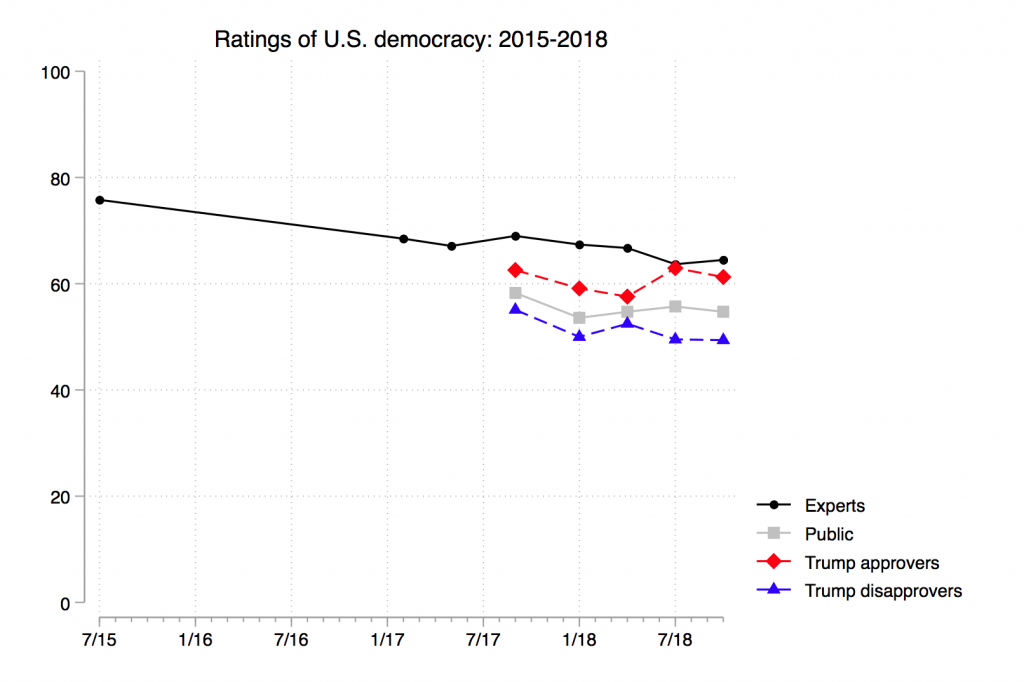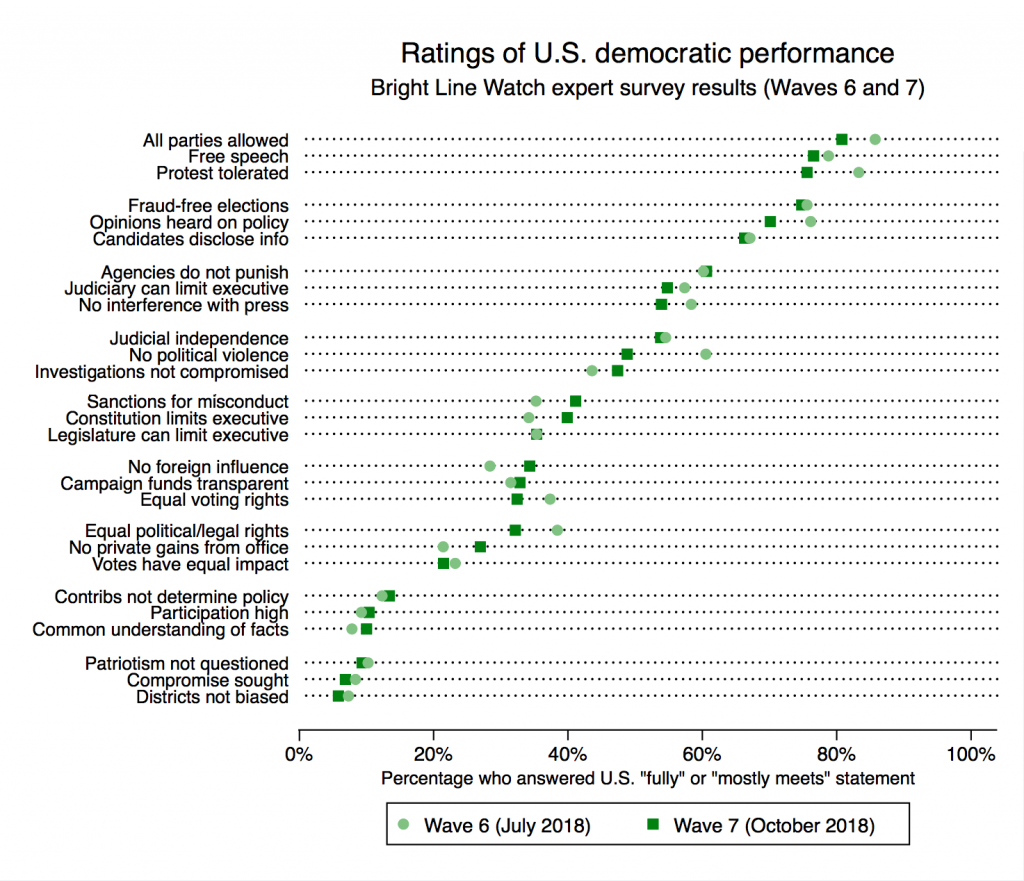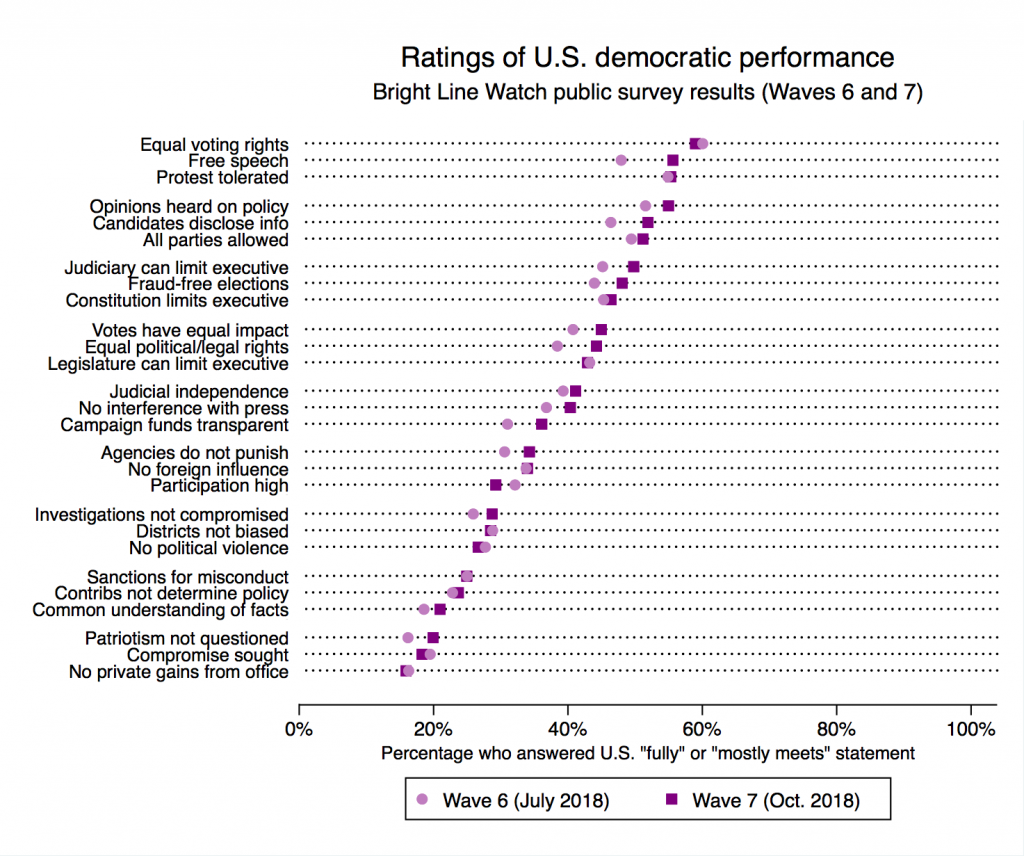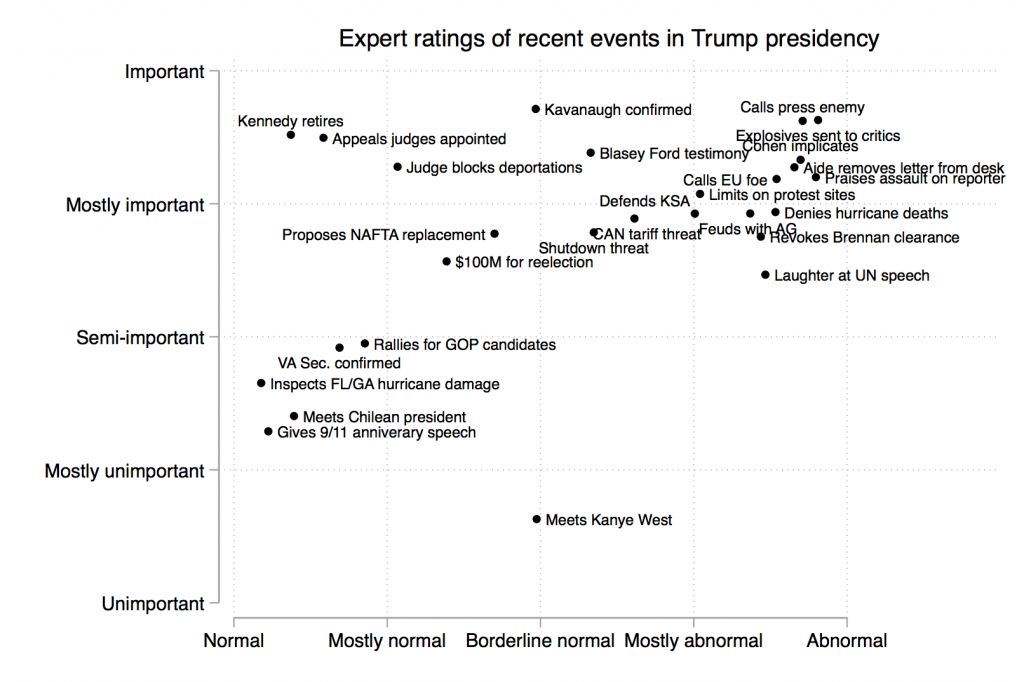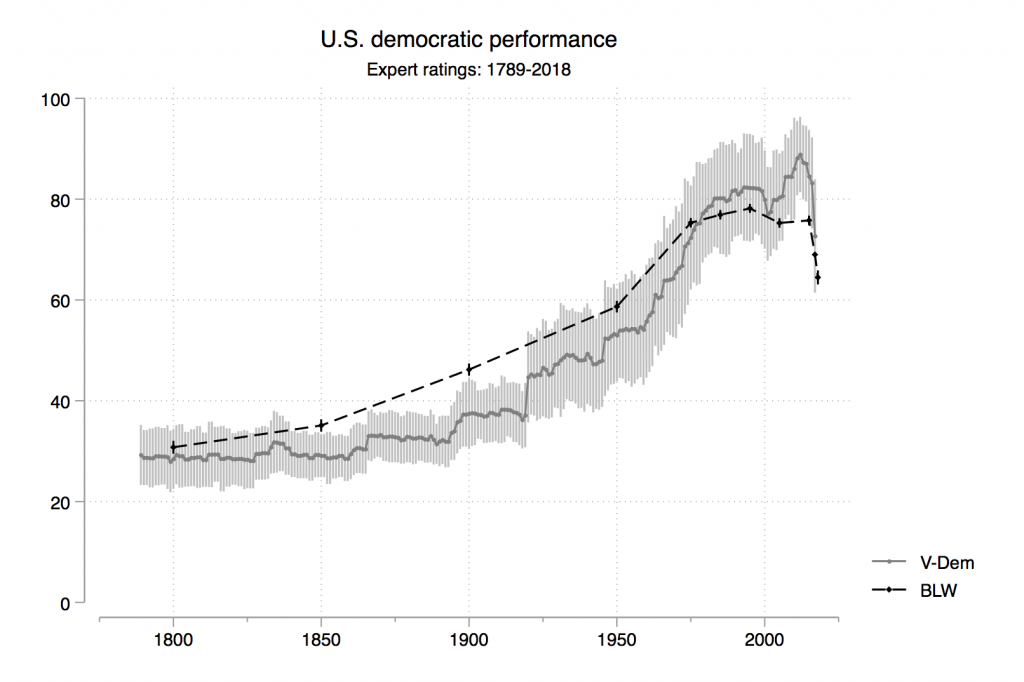Our mission at Bright Line Watch is to distinguish what is novel and unprecedented from politics as usual in the United States — a difficult task in the current news environment. To do so, we conducted our seventh expert survey, and fifth public survey, in October 2018. Our goal was to assess the state of American democracy just before the first midterm elections of President Trump’s administration.[1]
The main results are the following:
-
Our expert and public samples show stability in their overall ratings of U.S. democracy from Wave 6 (July 2018) to Wave 7 (October 2018).
-
Experts perceive a significant decline in the U.S. government’s performance at protecting individuals’ right to engage in peaceful protest and preventing politically-motivated violence.
-
Experts rate a number of recent events as both highly abnormal and highly important.
Between October 24 and 31, 2018, we surveyed an expert sample of 747 political scientists at American colleges and universities and a nationally representative public sample of 2,000 American adults. As in previous waves, respondents in both surveys assessed the degree to which 27 democratic principles (listed in the appendix to this report) are currently upheld in the United States. They also evaluated the overall quality of American democracy on a 100-point scale. In addition, participants in our expert sample rated a set of 27 recent political events on two separate scales—how important or unimportant they are and how normal or abnormal they are in the context of U.S. politics.
Ratings of U.S. democracy, 2015–2018
We first explore expert and public ratings of the overall quality of American democracy on a 100-point scale. The figure below shows changes in perceptions of democracy since we began conducting our surveys.[2] We show the democracy ratings for our expert sample, the public overall, and the public disaggregated by their approval of Donald Trump.
Consistent with previous Bright Line Watch surveys, expert ratings of American democracy are higher than those of the public. The average score for experts is 64.5 on a 100-point scale. The mean rating for the public is 54.7, but Trump approvers rate U.S. democracy higher than disapprovers (61.3 versus 49.4, respectively) — a pattern that closely mirrors the one observed in our last survey almost precisely (62.9 versus 49.5 in July 2018). Although we see slight increases in democracy ratings among experts and slight decreases among the public compared to our Wave 6 survey, these shifts are not statistically significant. Overall, the trend between July and October 2018 indicates stability.[3]
Performance on democratic principles
Next, we unpack respondents’ ratings of how well 27 democratic principles are currently upheld in the United States. A full list of these principles is included in the appendix. To measure perceived democratic performance, we compare the percentage of respondents who rated the United States as “fully” or “mostly” meeting a given democratic standard with the percentage saying the United States only “partially meets” or “does not meet” it. The figures below compare ratings from the public (purple) and experts (green) in our July and October 2018 surveys.
Consistent with the overall ratings of U.S. democracy, we see relatively small shifts in the public’s ratings of performance on our democratic principles. Only four are statistically significant: slight increases in perceived performance on supporting free speech, equal political/legal rights, candidates disclosing information, and campaign funds being transparent. These increases may be the result of the salience of the midterm election that was pending when the survey was in the field.
Among our expert respondents, by contrast, we observe just two statistically significant changes, but they are notable — declines in perceived performance on toleration of protest and a lack of political violence. The share of experts agreeing that the U.S. “fully” or “mostly” meet the standard for tolerating peaceful protest declined from 83% in July 2018 to 76% in October 2018. Similarly, 60% of experts said the U.S. “fully” or “mostly” met the standard of not having political violence in July, but this figure dropped to 49% in October. We speculate that these declines are the result of recent, high-profile events that brought protests and violence into the spotlight.
With regard to protests, the Senate Judiciary Committee’s investigation into Brett Kavanaugh and the lead-up to his confirmation as a Supreme Court justice sparked large protests in Washington, D.C., and the arrest of more than 300 protestors (including prominent comedian Amy Schumer). Moreover, in early October, the Trump administration proposed new regulations to drastically limit the rights of protesters near the White House. Additionally, the viral spread of the “Jobs not mobs” meme and Twitter hashtag used by conservative media outlets, Republican candidates in the midterm elections, and Donald Trump himself sent a strong message against individuals engaging in peaceful protest.
Political violence has also grabbed headlines in recent months. Beginning on October 22, fifteen packages containing pipe bombs were sent to Democratic politicians and critics of Donald Trump, including Barack Obama, Joe Biden, and Hillary Clinton. While the packages were intercepted before reaching their intended recipient, they indicated a troubling escalation in politically-motivated violence. In addition, on October 27, a gunman motivated by anti-Semitism and fears of immigrants opened fire at the Tree of Life synagogue in Pittsburgh, PA, killing eleven and injuring seven. Commentators have called the midterm elections a “rallying point” for far-right extremists to organize anti-semitic efforts against Jews in the United States.[4]
What’s (ab)normal and (un)important in the Trump era
Finally, we consider how experts perceive recent events, including many recent actions by President Trump, by asking them to evaluate each item’s importance and the degree to which it fits with normal political practice. We focus primarily on events that took place between our last expert survey, in July 2018, and the current round. A full list of the events is included in the appendix to this report. In the figure below, the markers indicate the mean values of the expert responses on five-point scales of importance and (ab)normality. Consistent with the July survey, the items are more dispersed across the normalcy scale (the horizontal axis) than the importance scale (the vertical axis).
We first consider what is not both new and significant. Developments in the judiciary were considered important but relatively normal by experts; these include Anthony Kennedy’s retirement from the Supreme Court, the appointment of new appeals court judges, Brett Kavanaugh’s confirmation as a Supreme Court justice, Christine Blasey Ford testifying against Kavanaugh, and a judge blocking the administration from deporting reunited families who had been separated. Other standard presidential events such as rallies, speeches, travel, and meetings were considered both normal and unimportant.
However, of the 27 events included in our list, 15 were rated as both significant and unusual in the context of U.S. politics (i.e., above the midpoint for both importance and normalcy). Looking at the top right corner of the chart, many of the events that our experts rate as the most important and abnormal concern speech acts that are unrelated to presidential authority or public policy — a trend we also observed in our Wave 6 survey. Specifically, Trump’s vocal criticism of the media, his praise of a Republican congressman’s physical assault on a reporter, his denial of the death toll from Hurricane Maria, and his calling the European Union a foe were all rated as both abnormal and important by experts.
Also rated high on both importance and abnormality were items related to Trump’s critics or disputes between Trump and his critics, including explosives being sent in the mail to prominent Democrats, Michael Cohen’s implication of Trump as a co-conspirator in his guilty plea, the ongoing feud between Trump and his (now former) Attorney General, Jeff Sessions, and Trump’s revocation of former CIA director John Brennan’s security clearance.
Finally, experts considered it both abnormal and important that a White House aide reportedly took a letter off President Trump’s desk to prevent him from withdrawing from a trade agreement with South Korea and that the Trump administration has proposed limits on the right to demonstrate near the White House and on the National Mall.
Appendix
Bright Line Watch surveys on the state of America’s democracy, October 2018
From October 24–31, 2018, Bright Line Watch conducted its seventh survey on the state of democracy in the United States. We conducted previous surveys in February (Wave 1), May (Wave 2), and September (Wave 3) of 2017, and in January (Wave 4), April (Wave 5), and July (Wave 6) of 2018. Waves 1 and 2 targeted expert respondents only. Waves 3–7 have paired the expert survey with a representative survey of the American public. Details on the Wave 7 survey are provided below:
-
Expert: On October 24, we sent email invitations to 10,747 political science faculty at universities in the United States. By November 4, after two reminder emails, we had complete responses from 747 (a response rate of 7.0%).
-
Public: YouGov fielded the public survey from October 24–31, producing 2,000 complete responses.
Both the expert and public samples in Wave 7 responded to a battery of questions about democratic performance in the United States. Afterward, they were asked to evaluate the quality of American democracy overall on a 100-point scale. Expert respondents were then asked to respond to a second battery in which they were presented with a series of statements about current political events and asked to rate them on normalcy and importance. Both the performance battery and the (ab)normality and /(un)importance battery are described in more detail below. The data from both the expert and public surveys are available here. All analyses of the public data from YouGov incorporate survey weights.
Performance battery
The foundation of Bright Line Watch’s surveys is a list of 27 statements expressing a range of democratic principles. Democracy is a multidimensional concept. Our goal is to provide a detailed set of measures of democratic values and of the quality of American democracy. We are also interested in the resilience of democracy and the nature of potential threats it faces. Based on the experiences of other countries that have experienced democratic setbacks, we recognize that democratic erosion is not necessarily an across-the-board phenomenon. Some facets of democracy may be undermined first while others remain intact, at least initially. The range of principles that we measure allows us to focus attention on variation in specific institutions and practices that, in combination, shape the overall performance of our democracy.
Bright Line Watch’s Wave 1 survey included 19 statements of democratic principles. Based on feedback from respondents and consultation with colleagues, we expanded that list to 29 statements in Wave 2. We then reduced that set to what we intend to be a stable set of 27 statements for the Wave 3 through Wave 7 surveys. 17 of those 27 statements were included in Wave 1, and all 27 were included in Wave 2.
The full set of statements is presented below and grouped thematically for clarity. In the surveys, the principles were not categorized or labeled. Each respondent was shown a randomly selected subset of nine statements and asked to first rate the importance of those statements and then rate the performance of the United States on those dimensions.
27 statements of democratic principles
Elections
-
Elections are conducted, ballots counted, and winners determined without pervasive fraud or manipulation
-
Citizens have access to information about candidates that is relevant to how they would govern
-
The geographic boundaries of electoral districts do not systematically advantage any particular political party
-
Information about the sources of campaign funding is available to the public
-
Public policy is not determined by large campaign contributions
-
Elections are free from foreign influence
Voting
-
All adult citizens have equal opportunity to vote
-
All votes have equal impact on election outcomes
-
Voter participation in elections is generally high
Rights
-
All adult citizens enjoy the same legal and political rights
-
Parties and candidates are not barred due to their political beliefs and ideologies
-
Government protects individuals’ right to engage in unpopular speech or expression
-
Government protects individuals’ right to engage in peaceful protest
-
Citizens can make their opinions heard in open debate about policies that are under consideration
Protections
-
Government does not interfere with journalists or news organizations
-
Government effectively prevents private actors from engaging in politically-motivated violence or intimidation
-
Government agencies are not used to monitor, attack, or punish political opponents
Accountability
-
Government officials are legally sanctioned for misconduct
-
Government officials do not use public office for private gain
-
Law enforcement investigations of public officials or their associates are free from political influence or interference
Institutions
-
Executive authority cannot be expanded beyond constitutional limits
-
The legislature is able to effectively limit executive power
-
The judiciary is able to effectively limit executive power
-
The elected branches respect judicial independence
Discourse
-
Even when there are disagreements about ideology or policy, political leaders generally share a common understanding of relevant facts
-
Elected officials seek compromise with political opponents
-
Political competition occurs without criticism of opponents’ loyalty or patriotism
To measure perceived democratic performance, the survey asked, “How well do the following statements describe the United States as of today?” Each respondent was then presented with 14 statements of principle, randomly drawn from the set above, and offered the following response options:
-
The U.S. does not meet this standard
-
The U.S. partly meets this standard
-
The U.S. mostly meets this standard
-
The U.S. fully meets this standard
-
Not sure
The order in which statements were presented in the battery was randomized for each respondent so there should be no priming or ordering effects in how they were assessed.
(Ab)normality and (un)importance battery
Our (ab)normality and (un)importance battery, which we administered to our expert sample only, is based on similar surveys conducted by the New York Times Upshot blog in February and May 2017. This battery asks respondents to assess a series of recent political events on their importance and on the degree to which they fit with normal political practice. We designed this battery for our Wave 6 expert survey in July 2018, but updated our list of events to cover the political context of the last few months. The list included the following 27 items:
-
President Trump being implicated as a co-conspirator in his former personal lawyer Michael Cohen’s guilty plea.
-
President Trump publicly feuding with Attorney General Jeff Sessions.
-
Federal judge blocking the Trump administration from deporting reunited families who were separated under the “zero tolerance” prosecution policy.
-
President Trump threatening Canada with auto tariffs.
-
President Trump proposing the US-Mexico-Canada Agreement to replace the North American Free Trade Agreement.
-
President Trump revoking the security clearance of former CIA director John Brennan.
-
President Trump repeatedly calling the press an “enemy of the people.”
-
President Trump claiming the official death toll from Hurricane Maria was wrong and made up by Democrats to make him look bad.
-
The Senate Judiciary Committee holding a hearing in which Christine Blasey Ford accused Supreme Court nominee Brett Kavanaugh of sexual assault.
-
World leaders laughing at President Trump’s remarks during his United Nations speech.
-
Judge Brett Kavanaugh being confirmed to the Supreme Court.
-
President Trump calling the European Union a “foe.”
-
President Trump saying the government of Saudi Arabia (KSA) was being treated as “guilty until proven innocent” in the death of journalist Jamal Khashoggi.
-
A White House advisor reportedly taking a letter off President Trump’s desk to prevent him from withdrawing from a trade agreement with South Korea.
-
The Trump administration proposing limits on the right to demonstrate near the White House and on the National Mall.
-
President Trump inspecting damage from Hurricane Florence in Florida and Georgia.
-
Senate confirming Robert Wilkie as Secretary of Veterans’ Affairs.
-
President Trump appointing numerous judges to federal appeals courts.
-
Justice Anthony Kennedy retiring from the Supreme Court.
-
President Trump raising more than $100 million for his 2020 reelection campaign.
-
President Trump speaking at the Flight 93 National Memorial to commemorate the 17th anniversary of the September 11 attacks.
-
President Trump meeting with Chilean President Sebastián Piñera at the White House.
-
President Trump threatening to support a government shutdown if Democratic lawmakers do not vote for border security, including “the Wall.”
-
President Trump holding rallies across the country to campaign for Republican Congressional candidates.
-
President Trump meeting with Kanye West at the White House.
-
President Trump praising a Montana congressman’s physical attack on a reporter.
-
Explosive devices being sent to prominent Democrats and critics of President Trump.
Each respondent was asked to rate nine items that were randomly selected from the list above on two separate five-point scales according to the following instructions:
-
Normal or Abnormal, where 1 is business as usual for a presidential administration, like vetoing a bill or appointing a cabinet, and 5 is highly unusual for American democracy, like Iran-Contra or ordering newspapers to halt the publication of the Pentagon Papers.
-
Unimportant or Important, where 1 has limited or no consequences for the federal government, like the first family’s pets or the menu for a state dinner, and 5 creates a significant or lasting change, like the establishment of Social Security or the Voting Rights Act.
Once again, the order in which the events were presented in the battery was randomized for each respondent to prevent priming or ordering effects.
Expert ratings of democracy historically and today
In our May 2017 survey, we asked the expert sample to rate the quality of U.S. democracy currently and retrospectively at nine historical dates: 1800, 1850, 1900, 1950, 1975, 1985, 1995, 2005, and 2015. We have asked for the same rating today in each of our seven expert surveys (February, May, and September 2017; January, April, July, and October 2018).
In the figure below, the black line with dots shows the average ratings from the Bright Line Watch expert sample for each historical date plus the May 2017 and October 2018 ratings. It is measured on a 0–100 scale. For comparison, the grey line shows the Liberal Democracy Index from the Varieties of Democracy Project (V‑Dem), rescaled to the same 0–100 scale, which extends back to the ratification of the Constitution in 1789. V‑Dem is a scholarly consortium that evaluates the quality of democracy around the world and over time using consistent methods and standards to aggregate the opinions of experts in 170 countries.
The trajectories sketched by V‑Dem and by the Bright Line Watch experts are remarkably consistent over time, though the Bright Line Watch assessments are a bit more tempered (slightly higher than V‑Dem from the mid-19th century to the mid-20th, slightly lower since). Notably, both indices drop sharply in the last few years of the series. V‑Dem’s data end in 2017 but Bright Line Watch experts perceive further decline in 2018 (from 76 in 2015 to 69 in 2017 to 64 now). We interpret this decline as a response to the events of the 2016 U.S. presidential election and the Trump presidency.
Notes
[1] At the same time, we also conducted a novel survey experiment on candidate choice in congressional elections, which estimates the degree to which voters are willing to prioritize democratic values in selecting candidates even when such choices might entail trade-offs against partisan or policy interests. Our report on this experiment is here.
[2] The 2015 estimate comes from a May 2017 survey in which we asked experts to rate the quality of U.S. democracy retrospectively at nine historical dates.
[3] We note that although expert ratings of U.S. democracy have been stable in recent months, they declined sharply after Donald Trump was elected president. The appendix to this report includes a chart showing expert ratings of U.S. democracy historically from Bright Line Watch surveys alongside ratings from Varieties of Democracy Project (V‑Dem)’s Liberal Democracy Index.
[4] See the Anti-Defamation League report, “Computational Propaganda, Jewish-Americans and the 2018 Midterms: The Amplification of Anti-Semitic Harassment Online.”

